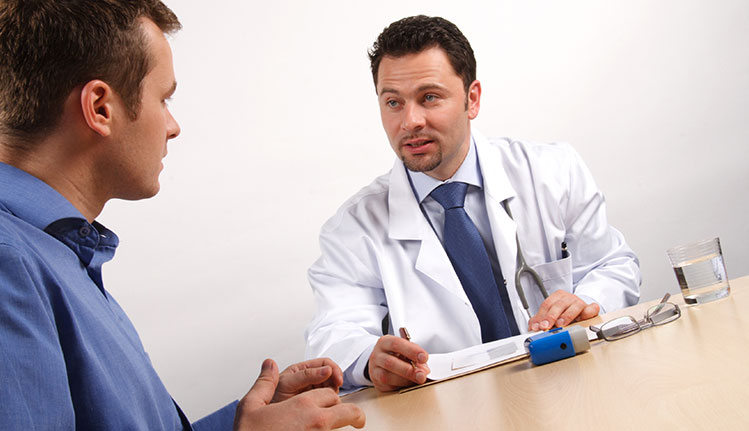Colitis and Crohn’s are chronic illnesses for which there is currently no cure. Both conditions can be controlled with medication and in more complex, severe cases surgery may also be necessary to relieve inflammation. There are several biologic medications that have proven to be effective at improving IBD symptoms. Your specialist will be able to advise you on which treatment is best for you.
MEDICINAL
Steroid Medication
Steroid treatment may be used to treat mild to moderate forms of Crohn’s or Colitis. IBD is an autoimmune disease which means that your own cells start attacking your body. Steroids work by suppressing the activity of these cells, which in turn will help to reduce inflammation. To relieve an initial flare up you may be given steroids intravenously (via a drip), you may then be given an oral drug to keep on top of your flare. Types of steroid given include prednisone, hydrocortisone, methylprednisolone and beclomethasone dipropionate.
Steroid medication can only be prescribed for short periods of time due to its side effects. You will need to taper down to slowly withdraw from the drug to avoid causing damage to your body. You may be offered an alternative drug called Azathioprine to help you withdraw from steroid medication.
Biological Medication
Biologic drugs are used to treat moderate to severe IBD and will usually be the next phase of treatment if steroids alone are not keeping the condition under control. Biologics are made from proteins and other natural substance. The drugs used to control IBD are ‘anti TNF’ drugs and works by blocking the TNF Alpha protein, which activates excessive inflammation in IBD patients.
There are four main Biologic treatment for Crohn’s and Colitis. Click the link for further information on each medication.
Infliximab (Remicade)
Adalimumab (Humira)
Vedolizumab (Entyvio)
Golimummab (Simponi)
Methotrexate
Methotrexate is a chemotherapy agent and an immunosuppressant. It is used to treat a number of cancers and has also found to improve symptoms of certain autoimmune conditions including Crohn’s Disease. Methotrexate can be taken as a tablet or given as an injection, it can also be used as an alternative to Azathioprine to help you withdraw from steroids.
SURGICAL
If IBD symptoms remain severe and medication is failing to control it then it may become necessary to remove the inflamed parts of the digestive system in order to relieve you from your symptoms. Below are some of the surgeries performed to treat Crohn’s and Colitis.
Colectomy/Proctocolectomy with Ileostomy
If the inflammation is widespread throughout the colon then you may be advised to have your colon removed. If the inflammation is affecting your rectum too, then you may be advised to have your rectum and colon removed which is called a Proctocolectomy. During this surgery a piece of your small intestine will be brought out through an opening in your abdomen. This type of stoma is called an ileostomy. In some cases, this will be a temporary measure and can be reversed.
Ileo-anal Pouch (J Pouch)
If you have had your colon and rectum removed, you may be offered ‘J pouch’ surgery to enable you to have your ileostomy reversed. The operation is usually done in two stages. The pouch, which is made from your small intestine is created and attached to your anus. You will have a temporary ileostomy while the join heals. Once the pouch has healed, the surgeon will reverse your ileostomy and join your small intestine back to where it originally was.
Following this operation you will likely need to go to the toilet up to 6 times a day. Waste from your small bowel is looser as most of digestion takes place in the large bowel, which has been removed.
Strictureplasty
This operation may be performed on patients with Crohn’s disease at this mostly affects the small bowel. Crohn’s disease can cause narrowing or strictures which can block the bowel and cause extreme pain. A strictureplasty is when the narrowed section is cut and sewn horizontally to widen the intestine.
Stomas
Some operations for Crohn’s and colitis involve the need of a stoma, usually an ileostomy but sometimes a colostomy.
An ileostomy is created by taking a piece of your small bowel and bringing it to the surface of your abdomen. This will look like a small, fleshy round tube sewn to your stomach. Initially, it may come as a shock, but many people soon adapt and find that health improves with this. Waste will exit via your stoma and you will need to wear a plastic pouch to collect the waste called an ‘ostomy bag’. Your bag will probably need emptying around 4-6 times a day and you will need to change the bag 2-3 times a week. You will have access to a stoma nurse or colorectal nurse specialist who will show you how to care for your stoma.
Further information and downloads can be found in the help and information section. Living with a bowel condition can affect you emotionally and socially; sometimes it can help to speak to others who understand your situation. The Bladder & Bowel Community Forum is available 24 hours today and will allow you to connect with those who share your condition. Start your own topic today or just follow one that interests you.









